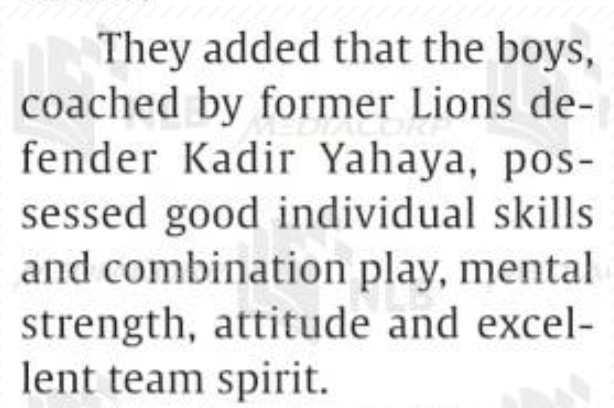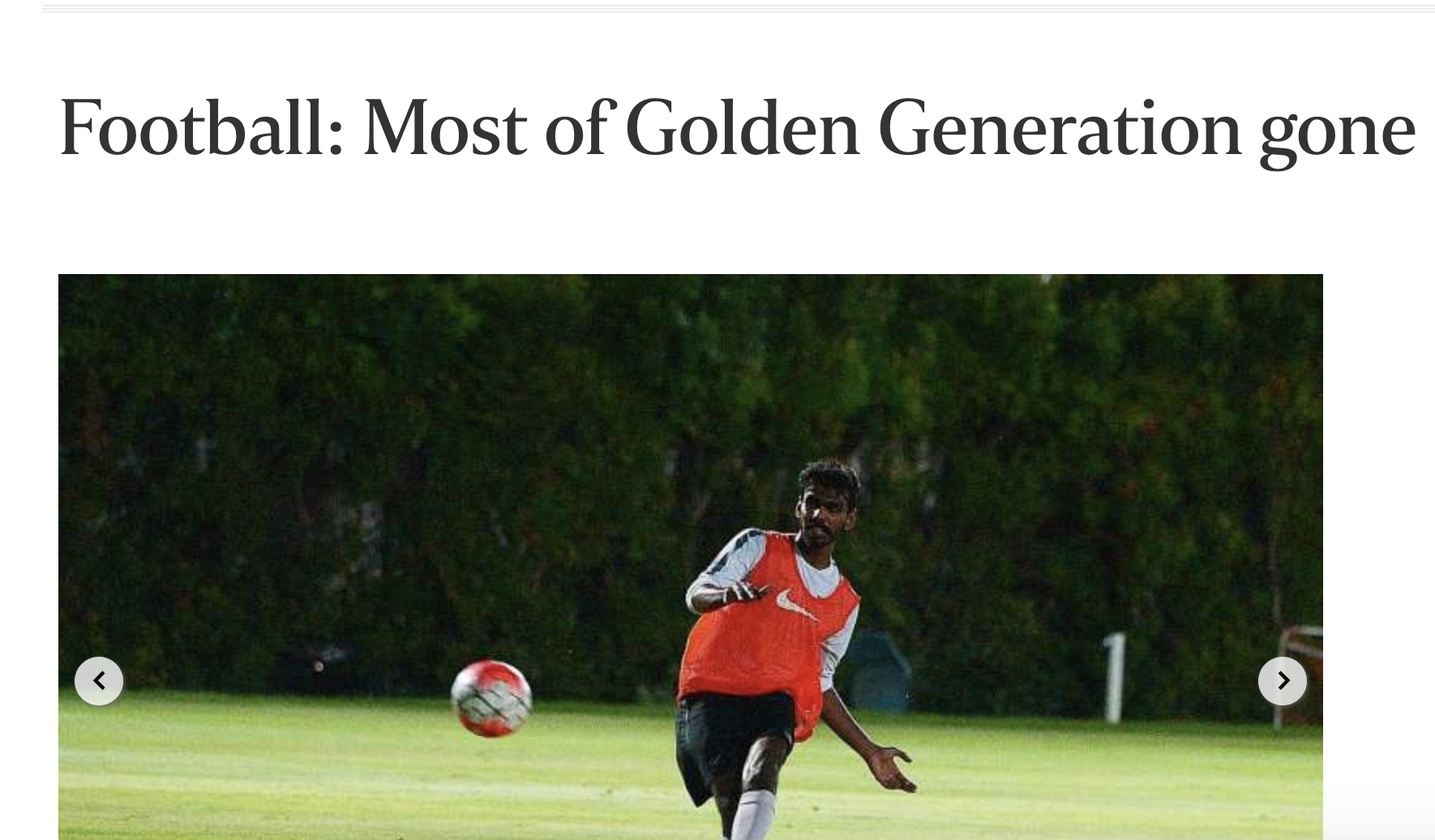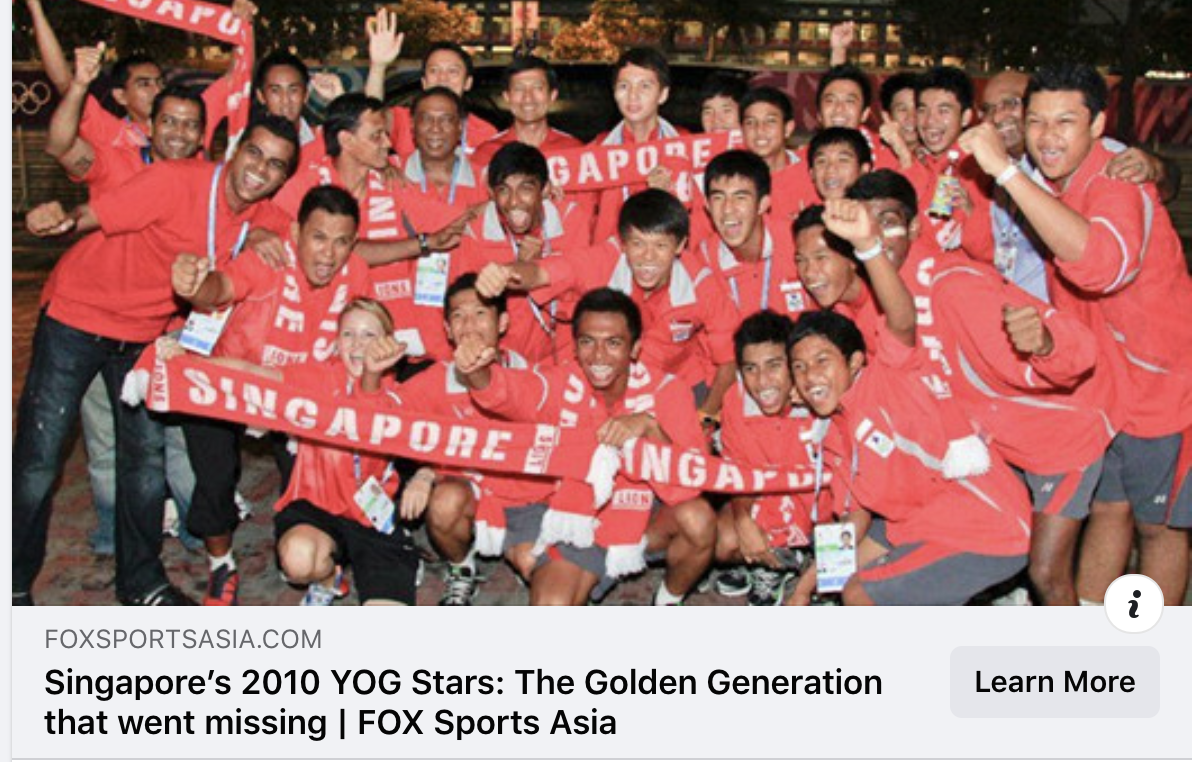In 2010, football in Singapore received a much needed boost when a crop of youngsters, captained by Jeffrey Lightfoot, and coached by 1994 Malaysia Cup dream team defender Kadir Yahaya, exceeded expectations during the Youth Olympic Games.
They had beaten Zimbabwe, and Montenegro in the group round, before losing to Haiti. They were then set to fight for third place against Montenegro.
Youth Olympic Games
The footballing nations competing in the tournament were by no means the cream of the crop, and some criticised the level of competition compared to other sports in YOG like basketball.
Still it was a keenly watched event.
For the international audience, there was Haiti. The young Haitians almost completed a fairy tale run in the competition, they were beaten in the finals by Bolivia, even though the team was only formed six weeks prior.
Haiti had been devastated by an earthquake that had wrecked their country earlier that year.
There were, as with any age-restricted competition, other whiffs of scandal during the tournament as well, with talk of potentially overaged players fielded by Bolivia.
But as the final whistle blew on the third-place decider, neither whispers of subpar competition or issues of overaged competitors mattered, Singapore had triumphed over Montenegro 4-1, thanks to goals from Hanafi Akbar and Ammirul Emmran.
Well-deserved celebrations.
But perhaps more important than a bronze medal, was the genuine hope that the young cubs had inspired in some quarters.
Their style of play, fearless relentless attacking football instead of long somewhat-hopeful balls to a waiting center forward, captured the public's imagination.
The young Singapore team impressed outsiders as well, even then-FIFA president Sepp Blatter commented on the "entertaining play" of the youths.
A report by FIFA in 2011, via a Today article, was equally effusive in their praise.
 Screenshot from NLB Archives/Today
Screenshot from NLB Archives/Today
According to Red Sports, this optimism was shared by then-Football Association of Singapore (FAS) president Zainudin Nordin
“I’m really confident that these boys have lots of potential. They played their hearts out today. It showed their spirit that after defeat in the semi-finals, they have woken up and learnt from their lessons by beating Montenegro again with a resounding scoreline. If we put the supporting infrastructure, trainings and sports science, these boys can go as far as they can,”
As far as they can.
The promise of a burgeoning Golden Generation.
Failed promise
Fast forward 10 years though, and that promise has not been fulfilled.
The headlines over the years have been almost ominously spelling out the current reality of the Golden Generation.
 Screenshot of The Straits Times
Screenshot of The Straits Times
 Screenshot of the Straits Times
Screenshot of the Straits Times
It all culminated in a 10-year YOG anniversary piece by The Straits Times on August 24 talking to eight footballers from that vaunted 2010 team.
In 2016, in an ST article titled "Football: Most of Golden Generation gone", there was a table that listed nine of the players, and which S-League team they were at now.
In 2020, according to ST, only two are still playing professionally.
Funnily enough, the Football Association of Singapore actually responded to ST's 2016 article regarding where the players were.
Prospects and reality
In their response, they pointed out that the ST article had left out a few players who were currently plying their trade with S-League teams.
They expressed disappointment that the ST reporter omitted an important piece of information that "despite natural attrition, around three quarters of the 2010 (YOG) football team is still playing football – which is a good number".
In the statement, there was also this sentence:
"While it remains difficult to predict the career trajectory of any 15-year-old, we remain confident that with enough support from all stakeholders, the plan laid out by Mr Sablon will help to widen and deepen our football talent pool in terms of both players and coaches."
In the context of the piece, FAS was referring to youth development under famed Belgian technical director, Michel Sablon, who was then a new hire by FAS.
However the phrase "while it remains difficult to predict the career trajectory of any 15-year-old" could be theoretically used as a response to criticisms over any professional footballing body's handling of the YOG team as well.
In fact, FAS highlighted then-head coach Alex Tardy's quotes to ST:
"Youth teams are generally developmental sides; rejuvenation and renewal of teams across the different age groups is part and parcel of football at the developmental level all over the world, not just in Singapore."
Basically, you might be elite-tier at 15, but that doesn't mean you'll be in the same tier at 20.
That is of course a very commonly-seen phenomenon in the footballing world. Touted world beaters like Freddy Adu and Fabio Paim have not had anywhere near the career they were tipped to have.
Even for YOG, the top scorer, Bolivia's Rodrigo Mejido has not had much success in his post-YOG career with the national team. Similarly none of the Singapore YOG team has earned a full international cap.
In contrast to that, at least two of Montenegro's players at the YOG (Nebojsa Kosovic and Aleksandar Boljevic) have gone on to represent their country at the senior level.
So perhaps it is all just a dice roll in the end.
Lost gold
But if it is indeed a dice roll, perhaps better dice could have been provided.
The most heartbreaking revelation of the recent ST interview with the team might have been their recounting of what happened after the glory.
In response to a question by ST on how they felt being labelled by some as the "lost generation", goalkeeper Fashah Iskandar had this to say:
"After the YOG, there was no follow-up… We had no coach, and we didn't even have a single training session for seven or eight months."
ST noted that Kadhir, a highly respected coach but one who did not always see eye to eye with the top brass in FAS, had quit just five months after YOG.
His teammates, midfielders Ammirul and Brandon Koh, also gave ST their takes on the aftermath of the bronze medal.
Ammirul said that while much was promised, "in terms of on-the-ground work, nothing was really done… We were on our own, things soon went downhill, and eventually they forgot about us".
Koh told ST:
"Throughout that whole (journey), you saw our development - from being nothing, to something, to becoming no-ones."
Failed promises
FAS celebrated the tenth anniversary of the YOG team on August 25.
Many in the comment section paid tribute to that young, exciting team they had cheered on back in 2010.Some wondered where they were now. Others lamented what could have been. Left to their own devices, maybe they really had gone as far as they can.
And when you look back at this YOG team, for all the talk right after of national pride and joy, all the lauding of fearless swashbuckling play by mere teenagers, and excited proclamations of what could be, one can't help but think that those who failed in their promises weren't the boys after all.
Image from FAS Facebook/ Photo: SPH-SYOGOC/Eddie Chen
If you like what you read, follow us on Facebook, Instagram, Twitter and Telegram to get the latest updates.

